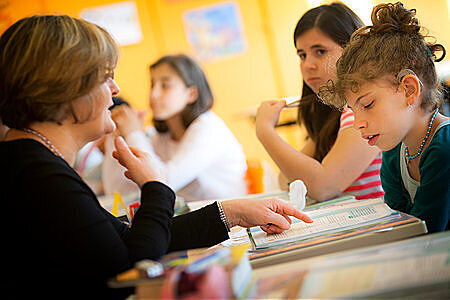UF study suggests children with cochlear implants need long-term interventions to improve language

Children with cochlear implants should continue to receive speech and language therapy throughout elementary school even if they appear to be performing well when they start school, according to a new University of Florida study.
The researchers found that sixth-graders with cochlear implants lagged behind their peers with normal hearing in areas of language development, particularly in their ability to recognize individual speech sounds, a deficit that may affect their academic performance. The findings appear in the Journal of Speech, Language, and Hearing Research.
“The acquisition of spoken language and literacy by children born with significant hearing loss has historically been challenging, until the advent of the cochlear implant,” said lead investigator Susan Nittrouer, Ph.D., a professor and chair of the department of speech, language, and hearing sciences at the UF College of Public Health and Health Professions, part of UF Health. “However, advances made in spoken language skills are largely observed at young ages, with many children who are deaf seemingly falling behind as they progress through elementary school.”
A cochlear implant works by converting soundwaves into electronic impulses that are sent to the brain, providing a sense of sound to people who are profoundly deaf. In the U.S., the device has been implanted in about 38,000 children. Cochlear implants are approved for use in children as young as 12 months. Experts recommend that children receive the implants before 18 months for optimal hearing and speech development.
Nittrouer and her team have been following a group of children with cochlear implants since they were infants to study their language development. Their development is compared with a group of age-matched children with normal hearing. When tested at kindergarten and second grade, the children with cochlear implants showed deficits in individual speech sound recognition.
In the new study, the UF researchers evaluated language skills in these children after they had completed sixth grade. The team wanted to see if the language and literacy instruction children receive in later elementary grades could lead to large improvements in speech sound recognition, bringing them closer to their peers with normal hearing.
Participants in this latest report included 29 children with normal hearing and 33 children with cochlear implants who had similar evaluations at second grade. The researchers measured how well the children could recognize individual speech sounds, how large their vocabularies were and how well they could combine words to generate sentences. Reading skills were also examined.
“Outcomes revealed that language performance of children with hearing loss was poorer than that of children with normal hearing by the same margin at both second and sixth grade,” Nittrouer said. “Of the three levels of language structure, speech sound recognition fared the worst.”
However, the researchers found children with cochlear implants who had strong literacy skills had better language development.
“Although literacy is usually viewed as building on top of spoken language skills, here we found that literacy instruction actually facilitated the development of spoken language,” Nittrouer said. “These results demonstrate that intervention with children who are deaf needs to continue through elementary school, with a strong emphasis placed on literacy instruction.”
In addition to Nittrouer, the research team included UF graduate students Meganne Muir and Kierstyn Tietgens; Aaron Moberly, M.D., an assistant professor in the department of otolaryngology - head & neck surgery at The Ohio State University; and Joanna Lowenstein, Ph.D., a research assistant professor in the UF department of speech, language, and hearing sciences. The study was funded by the National Institute on Deafness and Other Communication Disorders.
About the author
